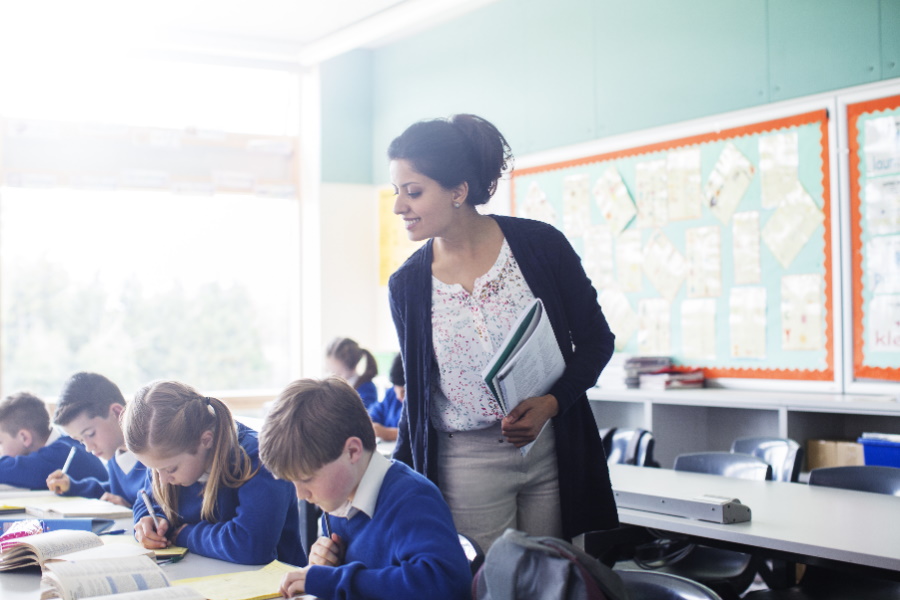
As an Early Career Teacher, the thought of finally being able to put into practice all the things you learned during teacher training is exciting, but you might also be feeling apprehensive. Here we’ve put together a summary of top tips from experienced teachers, practitioners and CPD experts to help you get prepared and feeling confident for your first day in your own classroom.
Planning, organisation and flexibility
When it comes to planning your first lesson with your new class(es), being organised is important – but so is flexibility and adaptability. As most new teachers know from their training, lessons don’t always go to plan, with students sometimes getting through material much quicker than expected or taking a while to get to grips with a task. You also need to factor in the inevitable delays of simply getting the class settled and ready with everything they need. Sue Cowley, author of How to Survive Your First Year in Teaching, advises against planning anything too ambitious for your first lesson as it’s likely you’ll need to spend time on administrative and organisational tasks like taking the register, getting students into seating plans and setting out your expectations to students. On the other hand, it can be easy to fall into the trap of spending too much time on the administrative side of things and setting rules and expectations, and teachers sometimes forget to spend time getting to know their new students. These first lesson icebreakers for KS2-4 are great for helping students to get to know each other, start to feel more comfortable in their new class and build a sense of community in the classroom. They’re also a fun way for you to start learning more about your students.
Set the tone
The first lesson with your new class(es) is the time to show your students what to expect in your classroom and what you expect of them. Try to avoid diving straight in before you discuss your ideas and expectations for classroom behaviour. This sets boundaries early on and gives students a clear understanding of your expectations. In her book, Sue Cowley encourages new teachers to show confidence. It’s natural to feel nervous about your first lesson, but a confident persona is really important for getting better behaviour from your students. Children pick up on uncertainties and can respond with misbehaviour. Boost your confidence levels by making sure you have a clear understanding of the whole school behaviour policy.
When it comes to setting rules and expectations for your classes, Head of ITT for the Fylde Coast SCITT, Aly Spencer, encourages openness and honesty. She advises that while it is important to maintain the school’s expectations and know the school policies, it’s a good idea to establish your own classroom expectations with students and stick to them as a team. This helps to build trust with students and allows them to feel respected and valued.
Lorna Smith, Senior Lecturer in Education at the University of Bristol, advises new teachers to keep rules to a minimum and focus on positivity, avoiding creating a list of ‘don’ts’. Discussing classroom rules as a class, explaining their purpose and reviewing them regularly as a class is key. Read more of Lorna’s tips for behaviour management.
When you’re less experienced or not yet established in a school, it tends to give you less margin for error in terms of managing the learning of your students. Children have a sixth sense for when there is a lack of structure or composure when a lesson starts. Students actually respond best to structure and consistency and the beginning of a lesson is the perfect opportunity to show them that’s what they’ll be getting. Andy Sammons, author of 'The Compassionate Teacher' and head of department, shares his advice on starting a lesson well with some great tips to consider for first lessons and beyond.
Going beyond day one
Starting off well on that first day will help you to feel confident and set the tone for the new school year - but don’t panic if it doesn’t all go to plan. You have plenty of time to get to know your new students, develop your teaching style and implement those teaching strategies you're dying to try out.
For more tips to help you get through the school year as a first year teacher, take a look at 20 tips for surviving as an NQT, or explore our CPD library for resources and articles on teaching and learning, SEND, wellbeing and more.
References:
Cowley, S. (2013). How to Survive Your First Year in Teaching. United Kingdom: Bloomsbury Publishing.
